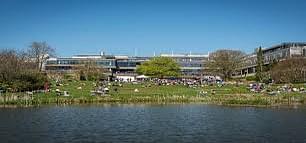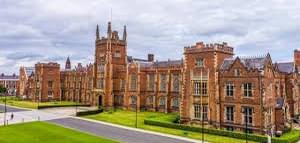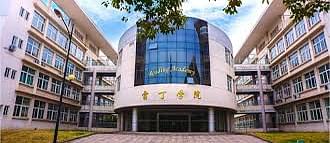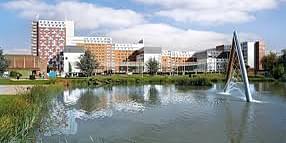Master of Science [M.Sc] (Electrical Engineering for Sustainable and Renewable Energy)
STEM Course
1 year
Full Time
On Campus
College Partner
Ranked #98 out of 1374 by THE Global Ranking 2024
₹31.9 L/Yr
£27,200 /Yr
Tuition Fees
| Year | 1st Year Fees |
|---|---|
| Tuition Fees | ₹3192192 (GBP 27200) |
Other Expenses
| Head | Avg Cost Per Year |
|---|---|
| Room and Board | ₹817530 (GBP 6966) |
| Total Cost | ₹817530 (GBP 6966) |
Previous Year Tuition Fees
| Year | 1st Year Fees |
|---|---|
| 2021 | ₹4291855 (GBP 36570) |
- Master of Science in Electrical Engineering for Sustainable and Renewable Energy at the University of Nottingham is a 1-year program.
- It is an on-campus program offered on a full-time basis.
- This university is consists of one of the largest research groups in Power Electronics, Machines, and Control in the world declared by the Power Electronics Research Group.
- This 12-month course will give an advanced coverage of the specialist engineering skills required by an engineer working in electrical technology for renewable and sustainable energy systems.
- This course will be taught full-time over 3 semesters or one calendar year.
- Students will complete 120 credits of taught modules in the autumn and spring semesters, followed by an individual project with a dissertation worth a further 60 credits in the summer semester.
- The module contains both written assignment(s) and a year-end exam which is mostly weighted as 50%.
- Teaching for this course usually takes place from Monday to Friday with the exception of Wednesday afternoon when students are involved in extracurricular activities.
- About 100% of postgraduates from the Department of Electrical and Electronic Engineering secured work or further study within six months of graduation.
- This course is accredited by the IET (Institution of Engineering and Technology).
- The University of Nottingham is one of the largest research groups in Power Electronics, Machines, and Control in the world.
- The University of Nottingham ranks 2nd in the UK for Electrical and Electronic Engineering by the Guardian University Guide 2021.
- It also ranks among the top 100 universities internationally for Electrical and Electronic Engineering according to QS World University Rankings by Subject 2020.
Read More
Eligibility & Entry Requirement
Indian Student Eligibility:
Indian students are eligible to apply if they complete one of the following eligibility criteria:
- Students should hold a bachelor’s degree from a recognized university, usually in a relevant subject area. This should be equivalent to at least a UK ‘Upper Second Class (2:1)’ or ‘Lower Second Class (2:2)’ degree.
- Students from Indian Universities should score 60% in Upper Second Class (2:1)’ or 55% in ‘Lower Second Class (2:2)’ degrees. These are the college minimum scores and particular departments may seek grades at a higher level.
- Applicant should hold a GPA of 3.0 (Upper Second Class) or 2.6 (Lower Second Class) out of 4.0 or hold a GPA of 6.0 (Upper Second Class) or 5.5 (Lower Second Class) out of 10.
English Language Requirements:
- TOEFL: minimum 90 in ibt
- IELTS: minimum 6.5
- PTE: minimum 71
Read More
Scores Required
Required Document List
The Documents required are:
- Resume/CV - This provides a summary of a student's experience and skills.
- Higher Secondary School Certificate - The certificate provided by the education board after completion of the Higher secondary education.
- Statement of marks - The marks statement provided by the education board.
- Financial Documentation - The Proof that shows the financial background of the student.
- Letter of Recommendation - This shows who recommended the student to pursue the degree.
- Statement of Purpose - This is an essay or any written statement written by the student while applying.
- English Language Requirement Scores like TOEFL, IELTS,..etc.


Do you think the Rankings are wrong ? Report Here
TOP Scholarships
| Scholarship name | Award amount | Eligibility |
|---|---|---|
| - | - | - |
| - | - | - |
| - | - | - |
Key Resources for Your Study Abroad Journey
Course Guides
Masters (MS) in UK: Top Universities, Fees, Requirements & Deadlines
Masters in Electrical Engineering in UK: Top Universities, Fees, Admissions, Scholarships, Scope
Study MA in UK: Top Universities, Admissions, Fees, Scholarships, Jobs
Career and Placement after Course
Possible career opportunities for the students are:
- IT business analysts
- Systems designers
- Programmers
- Software development professionals
- Production technicians
- Electrical engineers and engineering professionals
Read More
Scholarship Grants & Financial Aids
| Name | Scholarship Per Student | Level of Study | Type | |
|---|---|---|---|---|
| Goa Education Trust Scholarships | Scholarship per studentVariable Amount | Level Of StudyMaster | TypeMerit-Based | |
| Prodigy Finance-GyanDhan Scholarship | Scholarship per student₹ 2.9 L/Yr$2,500 | Level Of StudyMaster | TypeMerit-Based | |
| National Overseas Scholarship | Scholarship per student₹ 18.1 L/Yr$15,400 | Level Of StudyDoctorate | TypeNeed-Based | |
| Axol Science Scholarship | Scholarship per student₹ 2.3 L/Yr$2,000 | Level Of StudyBachelor | TypeCompany-Sponsored | |
| Bharat Petroleum Scholarship 2020 | Scholarship per studentVariable Amount | Level Of StudyMaster | TypeMerit-Based | |
| VueVille Future Technology Scholarship | Scholarship per student₹ 1.2 L/Yr$1,000 | Level Of StudyBachelor | TypeMerit-Based |
Similar Programs
| Program | Important Date | Total Fees | Median Exams Score | Action |
|---|---|---|---|---|
-- | INR 31.9 L/Yr GBP 27,200 /Yr |
|
Do you think the Dates are wrong ? Report Here
Similar Colleges


Robert Gordon University
Aberdeen, Scotland


University of Aberdeen
Aberdeen, Scotland


Aberystwyth University
Aberystwyth, Wales


University of Bath
Bath, England


Cranfield University
Bedford, England


Queen's University Belfast
Belfast, Northern Ireland


Ulster University
Belfast, Northern Ireland


University of Reading
Berkshire, England


Aston University
Birmingham, England



























Comments